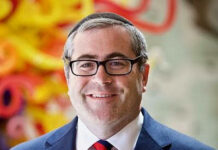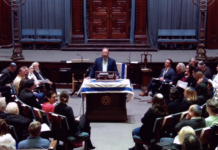Simchat Torah. It’s the Jewish holiday that comes after all the important Jewish holidays — Rosh Hashanah, Yom Kippur and Sukkot — this time of year.
At the end of one Torah-reading cycle and the beginning of another, it is the moment when we flip the calendar. No more deep reflections about the year behind us and the year ahead. It’s here.
That means it’s time to read the same book, the Torah, that we’ve read for thousands of years. But that’s the point, according to local rabbis from each denomination.
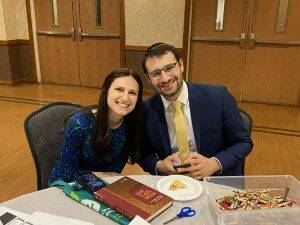
Orthodox: Rabbi Ezra Cohen of Lower Merion Synagogue (Bala Cynwyd)
Cohen wanted to share his thoughts on this subject via email. He felt that would allow him to think through his main points and summarize them clearly.
“The perennial repetition of the Torah breeds familiarity and serves to enhance our knowledge and recall,” Cohen wrote. “Additionally, our sages teach that contemplating the Torah and its teachings will never fail to yield new insights. Therefore, we can never truly be ‘finished’ reading it.”
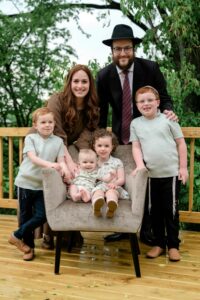
Chabad: Rabbi Zalman Blecher of the Lubavitch of Yardley
“The Torah is our lifeblood. The Torah is our oxygen. The Torah is our life. The Torah is limitless. The Torah is endless,” Blecher said. “If someone wants to know, ‘Hey, I’m Jewish. What does it mean?’ The only way you come to that answer is through the Torah. That is why we’re called the people of the book.”
“It’s not the matzah ball and brisket that have kept the Jewish people alive through the ups and downs of history. It’s the study of the Torah,” he added.
Blecher has been studying Torah for more than 30 years.
“There’s always something new,” he said. “Those stories contain so many insights that you can never get bored.”
The rabbi also explained that the democratization of information has made Torah instantly accessible to all.
“The plethora of online classes. Torah apps. YouTube. Podcasts. There’s no excuse for a Jew today not to be able to study the Torah,” he said.
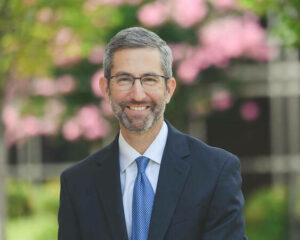
Conservative: Rabbi David Englander of Congregation Beth El (Voorhees, New Jersey)
“The way I like to phrase it is that the Torah doesn’t change but we change,” Englander said. “We gain new perspectives and insights. We focus on different aspects of Torah as we grow and change.”
“If you open up to that specific week’s Torah portion, you can always find a connection that helps you frame whatever it is you’re thinking about in Jewish terms,” he continued. “It was so carefully created that it resonates with eternality.”
Englander concluded with a hypothetical: “Let’s say there are 10,000 synagogues. Every single rabbi every single week is turning the pages of the Torah and finding a way to apply them to people’s everyday lives.”
“It’s the starting point for all we’ve become and for all we’re going to be.”
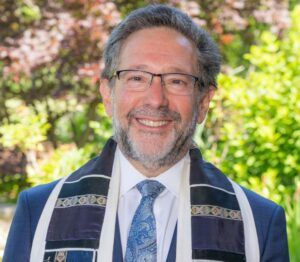
Reform: Rabbi Gregory Marx of Congregation Beth Or (Maple Glen)
Marx views the Torah as “a reminder of the covenant that exists between God and the people of Israel.” Without it, “we are nothing,” he said.
“We are just a community center. We have nothing that distinguishes us,” he added.
“I think reading the Torah is like looking at a classic painting. You can look at it a million times and see something different,” Marx continued.
In the story of Joseph and his brothers, the siblings sell Joseph into Egyptian slavery. Joseph is his father Jacob’s favorite son, so his brothers are jealous. But when Joseph helps the Pharaoh bring Egypt out of a famine, his brothers try to move there. Joseph lets them.
“You can read that story one time and say ‘Oh, that’s nice,’” Marx said. “If there’s family dysfunction, that story can take on a whole new meaning.”
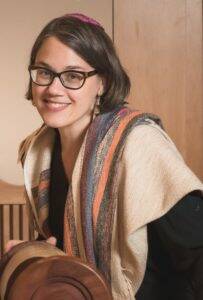
Reconstructionist: Rabbi Anna Boswell-Levy of Congregation Kol Emet (Yardley)
“Every single time we encounter the text, we are not the same. The world is not the same,” Boswell-Levy said. “We read the same story differently. And it’s not just that we read it. We reflect on it. And it’s not just that we reflect on it. We notice different things.”
Boswell-Levy believes it’s important to read the Torah each year. But she also thinks we should do it in community with others.
“Torah is a living thing that we embody. Torah is not just meant to be read. And it’s not just meant to be studied. It’s meant to be lived,” she said.



